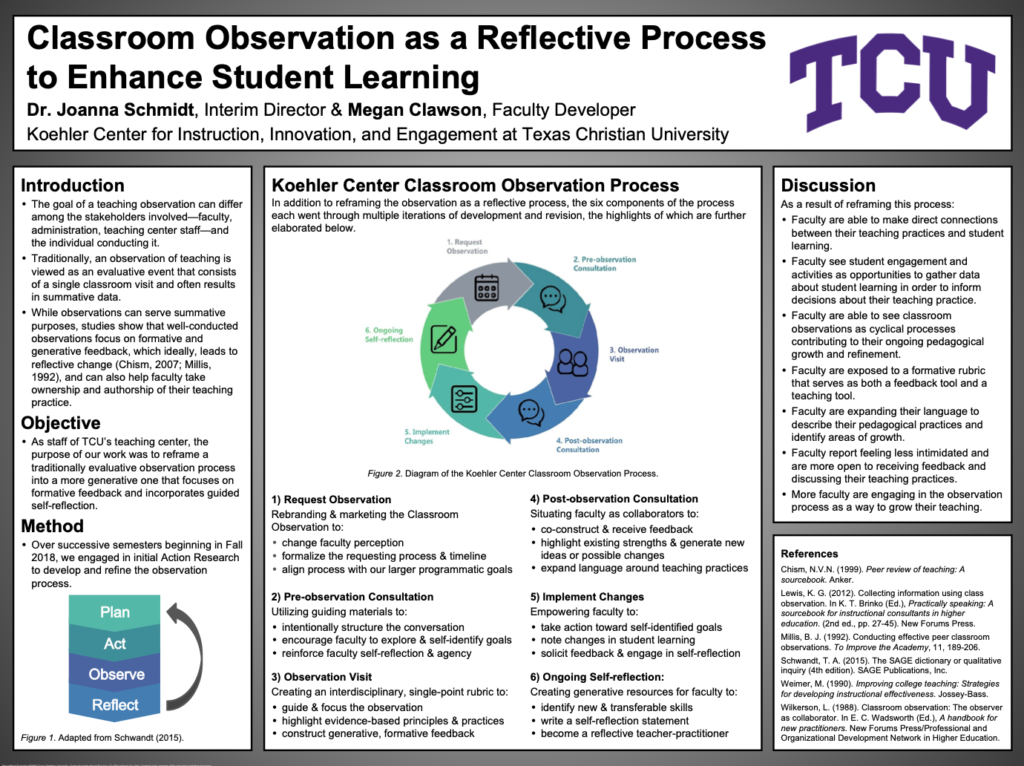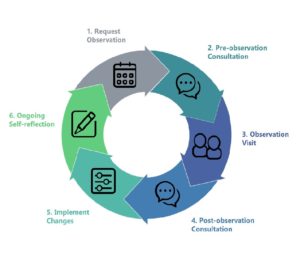What is a Classroom Observation?
A Koehler Center Classroom Observation is a reflective process intended to provide formative feedback through consultations, use of an observation rubric, and self-reflection. Although the process does consist of a single classroom visit, the real value of the observation process is in the ongoing reflective work that occurs after the classroom visit.
While departmental observations may focus on specific disciplinary knowledge and practices, the Koehler Center observation focuses broadly on evidence-based pedagogical practices. The observation is intended to be formative and generative rather than summative and evaluative, as studies show that the formative aspect is an essential component of an effective observation (Chism, 2007).
| The Classroom Observation process was recently presented at the AAC&U 2022 Conference on General Education, Pedagogy, and Assessment. |
How does the Classroom Observation process work?
An observation consists of multiple parts:
- Request Observation:
- The process begins with the instructor submitting an observation request informed by prior self-reflection. A Koehler Center faculty developer will work to confirm scheduling, and will request a course syllabus.
- Pre-observation Consultation:
- The instructor and Koehler Center faculty developers will meet to discuss the instructor’s teaching goals, the observation process, and the observation rubric. The instructor will also provide a basic lesson plan for the class visit.
- Observation Visit:
- Koehler Center faculty developers will visit the class, observe you teaching, and record observational data on the rubric. After the class, the instructor will also record notes on their copy of the observation rubric.
- Post-observation Consultation:
- The instructor and Koehler Center faculty developers will meet to revisit goals and discuss the observation. Instructors will be provided with a written report that includes the observational data, and any additional relevant resources. Together we will use the observational data to generate new ideas and strategies, and to help make some informed instructional decisions.
- Implement Changes:
- The instructor will use the observation data, resources, and notes from the Post-observation consultation to implement new ideas and strategies, and note changes or improvements in student-learning. Faculty developers will provide ongoing feedback and support as needed.
- Ongoing Self-reflection:
- The instructor will receive a self-reflection guide as a resource. They are encouraged to use the guide to write a reflection of teaching that describes changes to their teaching practice as a result of the observation. At the end of the semester, once the course is finished, instructors will also receive a follow-up survey providing an opportunity to share feedback on the overall impact of the observation process.
Instructors may choose to share their written reflections with departmental leadership, or they may choose to include them in a teaching portfolio for broader peer or departmental evaluations. We encourage you to check with your department regarding these expectations.
If needed, instructors may request a formal letter from the Koehler Center. It documents our interaction, and highlights specific information about the observation, changes implemented by the instructor, and impact on student-learning. If instructors would like a formal letter, we will ask them to send us their written reflection. The written reflection will help inform our writing of the formal letter.
What are the benefits of a Classroom Observation?
- Offers an opportunity to examine and reflect on your teaching practice
- Provides a safe environment to discuss your teaching practice in objective and concrete ways
- Allows for in-depth formative feedback
- Provides new insight to student behavior and performance
- Leads to pedagogical adjustments that can improve SPoT evaluations
- Is intentionally structured and thoughtfully facilitated to be an overall positive experience
Who can request one?
Anyone teaching at TCU can request an observation. This is a development opportunity the Koehler Center provides to the TCU teaching community. Observations are conducted by Koehler Center faculty developers.
Please note that conversations with Koehler Center staff are confidential. The Koehler Center will not share information generated during the observation process with anyone but the requesting faculty member.
How do I request one?
The Koehler Center is currently able to offer a limited number of Classroom Observations for In-Person Only classes. Please review the dates below for requesting an Observation.
To request an observation, please fill out this form.
Spring 2024:
- We are unable to offer observations this term.
Fall 2024:
- Request form opens Thursday, August 1, 2024
- Request form closes Monday, September 30, 2024 (or when capacity is full)
Summer Observations:
Due to various starting dates and course lengths for summer courses, please email the KoehlerCenter@tcu.edu for information about requesting an Observation during the summer months. Please include 3 possible Observation dates and times in your request email. Your request should be emailed at least 1 month prior to the date(s) you are proposing for the Observation.
References
Chism, N.V.N. (1999). Peer review of teaching: A sourcebook. Anker.
Lewis, K. G. (2012). Collecting information using class observation. In K. T. Brinko (Ed.), Practically speaking: A sourcebook for instructional consultants in higher education. (2nd ed., pp. 27-45). New Forums Press.
Millis, B. J. (1992). Conducting effective peer classroom observations. To Improve the Academy, 11, 189–206.
Weimer, M. (1990). Improving college teaching: Strategies for developing instructional effectiveness. Jossey-Bass.
Wilkerson, L. (1988). Classroom observation: The observer as collaborator. In E. C. Wadsworth (Ed.), A handbook for new practitioners. New Forums Press/Professional and Organizational Development Network in Higher Education.

